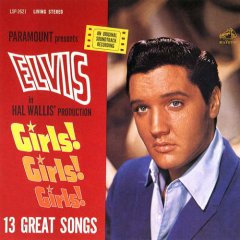Content
As soundtrack album sales far outstripped his regular album sales ( Blue Hawaii outselling Pot Luck with Elvis by ten to one) Presley found himself firmly entrenched in songs designed for a light-entertainment formula of beautiful scenery and girls galore. [10] With this discrepancy in sales, the formula of the soundtrack music became the focus. This formula for success would prove disastrous for Presley's career. Elvis continued recording non-movie singles and was never "entrenched" in only "movie music". Popular music was on the threshold of complete renewal and change and Presley would become 'lost in Hollywood'. Yet he was the no.2 most charted act on Billboard's pop chart of the '60s.
Sixteen songs were recorded at the sessions in March, of which thirteen were used for the soundtrack album. [11] Banished from the kingdom after running afoul of the Colonel, songs from favored writers Jerry Leiber and Mike Stoller could only be those already written for someone else, in this case the title track being a hit for The Coasters in 1961 before being adapted for the Presley film. [12]
The tracks "Return to Sender" and "Where Do You Come From" were issued as both sides of a single in October 1962, one month before the release of the soundtrack LP. "Return to Sender" became a substantial hit for Presley, peaking at number 2 on the Billboard Hot 100, while the B-side "Where Do You Come From" peaked at only number 99 independently of the hit side. [13]
The songs performed by Stella Stevens in the film—"Never Let Me Go", "The Nearness of You" and "Baby, Baby, Baby"—were in fact mimed to the singing voice of Gilda Maiken and have yet to be commercially released. [14]
The track "The Walls Have Ears", also translated as "Vent hobn oyern", is a reference to a Yiddish phrase warning how "someone's always listening." [15]
This page is based on this
Wikipedia article Text is available under the
CC BY-SA 4.0 license; additional terms may apply.
Images, videos and audio are available under their respective licenses.
